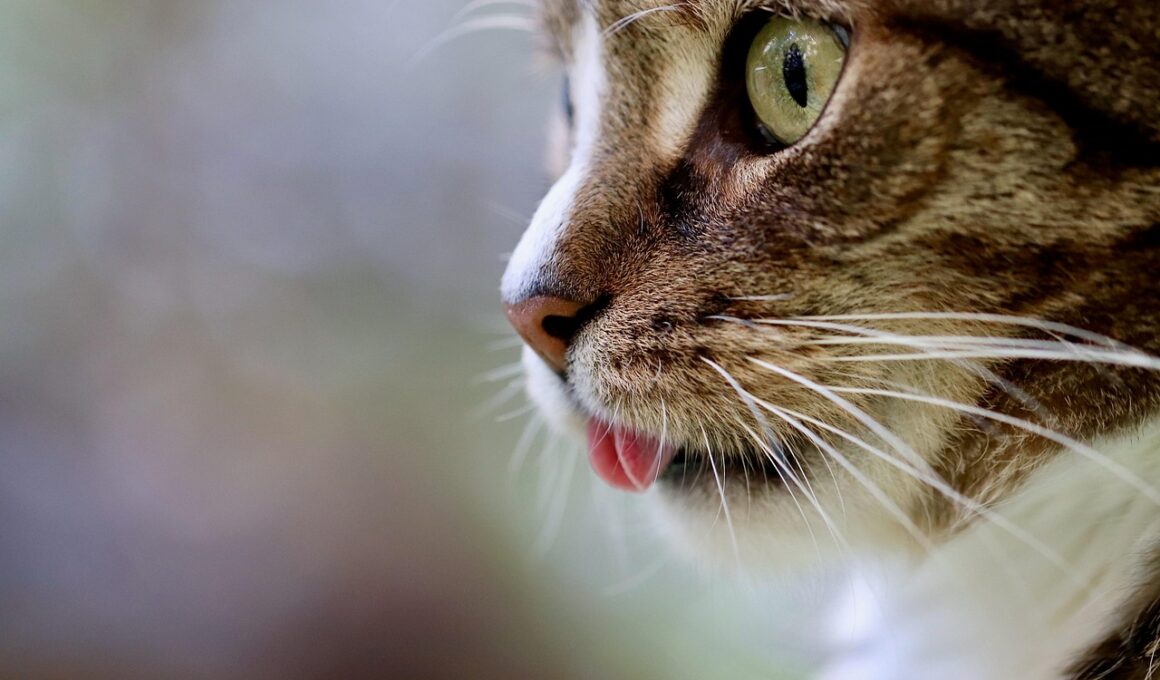Fact-Checking Top Cat Supplement Ingredients
When it comes to cat nutrition, many myths sometimes overshadow critical facts about supplements. One common myth suggests that all supplements are unnecessary if a cat eats high-quality food. In reality, even the best diets may not provide all essential nutrients. Factors such as age and health condition significantly influence your cat’s nutritional needs. The truth is that specific supplements can enhance well-being and correct deficiencies. For instance, omega-3 fatty acids support cardiovascular health and reduce inflammation. Moreover, it is essential to note that not all supplements are created equal. Some may contain low-grade ingredients or fillers that do not benefit your pet. Quality matters tremendously; thus, always choose products backed by research. Look for certifications from reputable organizations and check for transparent ingredient sourcing. Speaking with a veterinarian is vital to ensuring you select appropriate supplements tailored to your cat’s unique needs. Monitoring your cat’s health and behavior after introducing any supplement is also crucial for assessing effectiveness.
Another prevalent myth is that natural supplements are always safe. This belief can be misleading; while many natural ingredients offer benefits, they can also pose significant risks. For example, certain herbs like garlic may be toxic to cats, leading to serious health issues. Just because a product is marketed as “natural” doesn’t mean it’s effective or safe. Always consult your veterinarian before incorporating any new supplement, particularly if your cat is pregnant or has existing health concerns. It’s also essential to understand each ingredient’s role in your cat’s health. For instance, glucosamine is often promoted to improve joint health; however, this doesn’t mean it works for every cat. The effectiveness of glucosamine and similar supplements can vary based on individual needs. Cats suffering from arthritis or aging cats may respond positively, while others might not see improvement. In these cases, research-backed supplements that specifically target the identified issue are critical. Furthermore, looking for scientific evidence supporting the claims of efficacy can help make informed choices about your cat’s health.
Understanding Common Supplement Ingredients
One of the most commonly discussed ingredients in cat supplements is taurine. Many cat owners believe that taurine is nothing more than a trendy buzzword. However, taurine is essential for maintaining your cat’s heart and eye health. Cats require taurine in their diets since they can’t synthesize it from other amino acids like many other animals can. A deficiency can lead to severe health problems, including blindness or heart disease. Most commercial cat foods provide sufficient taurine, but supplementing might be beneficial for cats with unique dietary needs or health issues. Another beneficial ingredient is probiotics, which can help improve gut health and overall digestion. These beneficial bacteria can aid in nutrient absorption and enhance immune function. Probiotics are especially useful for cats experiencing gastrointestinal issues or those stressed by changes in their environment. Always choose probiotics formulated specifically for cats, as human formulations may not be appropriate or effective. Lastly, omega fatty acids, particularly omega-3 and omega-6, are crucial in a cat’s diet, aiding skin, coat, and joint health.
The benefits of fish oil supplements are widespread, yet misunderstandings linger about their side effects. Some cat owners presume fish oils lead to weight gain, but, when used properly, they can support healthy weight management. Fish oil provides essential fatty acids that help reduce inflammation and can assist in weight loss efforts. Nonetheless, moderation is vital, as excessive amounts can lead to gastrointestinal upset. Feed appropriate dosages based on your cat’s size, age, and health status, and consult your veterinarian if unsure. Selecting high-quality fish oil supplements from reputable brands is crucial, as the source of fish and the extraction methods can affect the oil’s quality. Moreover, it’s important to monitor your cat’s overall well-being after introducing new supplements. If any adverse reactions occur, cease usage immediately and contact a veterinarian. Additionally, consider combining supplements with a balanced diet and regular vet check-ups to ensure your cat remains healthy. Maintaining open communication with your vet will help guide you through the wide array of supplement options and support your cat’s individual nutritional requirements.
Regulating Dosages and Monitoring Effects
One must also be careful about the dosage and administration of cat supplements. Some owners mistakenly believe increasing the dosage will amplify the supplements’ effects, creating potential risks of toxicity or adverse reactions. Over-supplementation can lead to detrimental effects, including organ damage or other severe health issues. Always adhere to the recommended dosage provided on the product packaging or as advised by a veterinarian. Regularly monitoring your cat after starting supplementary regimens can provide insights into their efficacy and potential side effects. Track changes in behavior, appetite, and energy levels; these can indicate whether a supplement suits your cat. For example, increased energy or improved coat condition could signal that a supplement benefits your pet. However, if you notice any negative changes, discontinue use immediately. It’s also crucial to factor in existing medications or health conditions that could impact how your cat metabolizes supplements. Collaboration with a veterinarian will allow you to develop a tailored supplement schedule, ensuring it aligns with your cat’s health objectives and needs.
It’s essential to remember that not every cat supplement claims can be taken at face value. Owners commonly trust advertisement claims, but they may overshadow the scientific elements in research. To combat misinformation, always research ingredients extensively before choosing a cat supplement. Look for peer-reviewed studies or data supporting the effectiveness of claimed ingredients. Also, check for sourcing transparency, quality certifications, and whether the product undergoes third-party testing. Many companies follow strict standards to ensure their products’ safety and efficacy, providing essential documentation to ease owner concerns. Strong brands often have positive customer reviews and testimonials, which can also inform choices. Assessment of long-term potential benefits is crucial since immediate reactions might not reflect overall effectiveness. Therefore, be patient and give supplements adequate time to work, typically a few weeks or longer. Consulting a veterinarian for insights into product reviews or recommendations can serve as an invaluable resource in the decision-making process. Ultimately, making educated choices regarding cat supplements enables owners to foster their feline companions’ health and happiness.
The Future of Cat Supplements
As the pet industry evolves, so do the innovations surrounding cat supplements. Researchers continuously explore new ingredients and formulations to enhance feline health. Personalized supplements based on the specific needs of individual cats are becoming increasingly popular. Emerging technologies allow for precise analysis of dietary deficiencies, leading to tailored supplements that meet unique requirements based on breed, age, and lifestyle. Additionally, advancements in ingredient sourcing ensure higher-quality supplements focused on bioavailability and digestibility. This means that cats can absorb more of the nutrients, maximizing the benefits of supplementation. Moreover, increased awareness about holistic health approaches encourages the inclusion of functional ingredients, which can encompass added benefits like joint support, natural anti-inflammatories, or coat enhancing properties. As more cat owners prioritize their pets’ well-being, the demand for effective and safe supplements continues to grow. Understanding this evolving landscape fosters better choices for feline nutrition and health management. Staying informed on the latest trends and scientific findings is essential for pet owners intending to enhance their cats’ quality of life through proper supplementation.
In summary, cat supplements can play a vital role in your cat’s overall health, but understanding the facts amidst the myths is crucial. With many misconceptions surrounding their effectiveness and safety, educating yourself is the first step in making informed decisions. Assessing ingredients like taurine, omega fatty acids, probiotics, and glucosamine will enable pet owners to facilitate better health outcomes. Moreover, ensuring proper dosage, quality sourcing, and constant monitoring of health will enhance the supplement experience for both cats and their owners. Embracing a collaborative approach with your veterinarian provides the necessary guidance for personalized supplementation plans. While supplements can significantly support health, they are not a substitute for a balanced diet and regular veterinary care. The future of feline nutrition looks promising, enhanced by innovations and research advancements. Continuous exploration of ingredients will expand the options available for addressing health challenges faced by cats today. By utilizing research and expert guidance, cat owners can effectively navigate the complexities of cat supplementation, ultimately promoting the long and happy lives of their companions.


